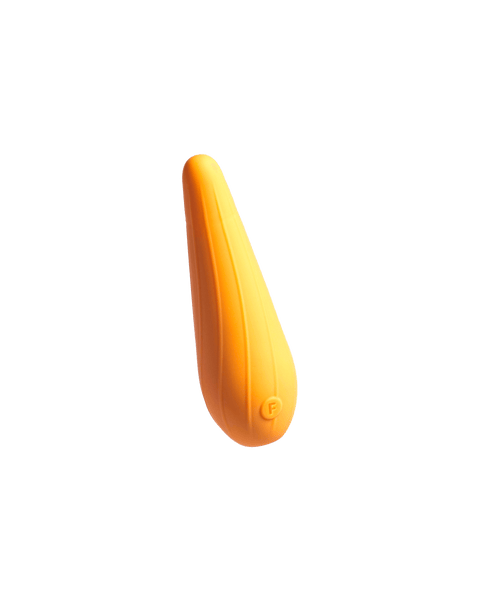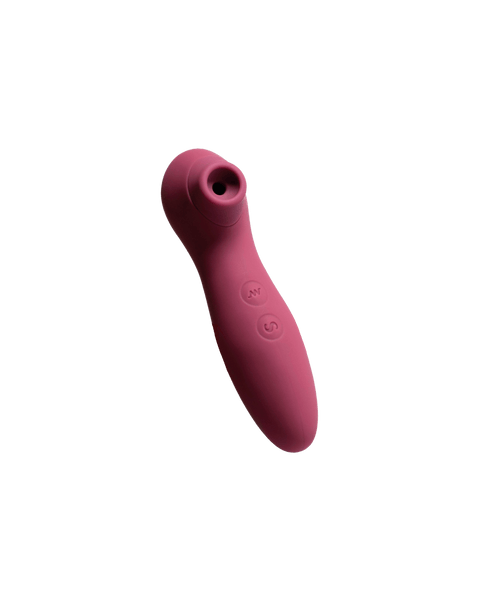As a society, we don't talk enough about sex after menopause. We tend to universally accept the idea that people become less and less interested in sex as they hit the "change of life".
This is true, to an extent, thanks to the significant bodily changes that pop up throughout the menopausal period, but it's not a blanket rule.
We know that sexual desire and sexual satisfaction does not necessarily wane for people as they age. Here at NORMAL, we don't believe in the erasure of the facts: menopausal people still want to get it on.
Let's examine the often misunderstood experience of sex during and after menopause.
What is menopause?
Menopause is a post-reproductive stage of life where estrogen and progesterone production, the two vital sex hormones for those with vulvas, come to a halt.
It occurs in middle-aged people with ovaries (usually around the age of 51), but early menopause can happen in some instances too.
It brings hot flushes, night sweats, tiredness, cramping, weight gain, irregular and sometimes painful periods, chills, weight gain, mood changes and self-esteem issues. Fun, right?
These changes can mean that an interest in sex and sexual desire can drop. The emotional impact of low desire can be frustrating, to say the least.
There's a reason why menopause is referred to as the 'change of life'. It can signify many positive social, emotional and physical changes in a person's life; you will stop having a period, you won't need to worry about contraception and no more PMS.
What's more, life begins at 40, right? It can be a great time in your life to rediscover yourself.
Can you still have sex after menopause?
Yes! Of course! Yes yes yes! But, it will likely be different from the sex you've had up until this point.
Clinical studies show that regardless of age and menopausal status, an interest in sex and the desire for a healthy sex life doesn't change.
However, sexual activity after menopause will likely not be the same as it was pre-menopause. There will be hurdles to cross due to hormonal imbalances and other health concerns. But this doesn't mean sex during menopause isn't wanted, desired and very much sought after.
And, don't forget, you've made it this far! You deserve to celebrate this incredible journey your body has been on. If you're trans or non-binary, you especially deserve to celebrate and take stock of the phenomenal ride your body has gone through.
But we can't deny that for many people, the process of menopause is normally a painful, uncomfortable and inconvenient one. It can affect libido, cause issues with your mental health, give you high blood pressure, cause irritation to vaginal tissue and lower your energy levels.
But every person's menopausal symptoms and journey will be different and, your desire and interest in sex after menopause won't be a universal experience either.
How does menopause affect us?
There are a variety of reasons why you will feel differently towards sex after menopause. Let's look at what menopause actually does to the body and sexual arousal.
As you approach menopause, the ovaries start to slow down the production of estrogen and progesterone. This is the perimenopausal period, where your hormones are fluctuating as they work to halt your menstrual cycle.
You will start to notice your periods are different: lighter, heavier, shorter, longer — any of the above can be true and as we have said, it's a different experience for all people.
Perimenopause is when the dreaded hot flushes and night sweats appear, too, causing discomfort and exhaustion during the day and sleep problems at night. These changes can also alter your moods, making you feel down and flat.
No wonder you might not feel like getting in on!
On average, this period lasts between four to five years. Once your period stops coming for 12 consecutive months, that is a sign that menopause has come to an end. It will likely be gradual as your periods get lighter and lighter before disappearing completely.
Why is sex affected by menopause?
Hormones affect your sex drive at all stages of life. The surges of hormones during puberty make you super horny. The hormonal changes in pregnancy can both lower and increase your sex drive at different points of gestation.
Your dwindling periods during perimenopause mean your estrogen levels will be dropping dramatically within the first 12 months.
Estrogen is the sex hormone that helps keeps the vagina elastic, moist and primed for reproduction between your teens and up until menopause. The nosedive this hormone takes will ultimately cause vaginal dryness and tightness.
There's no escaping the fact that menopause has a huge impact on your sexual function — it can lower desire and make arousal and orgasms more difficult to come by. It can also make sex more painful (especially when a penis or sex toy enters the vagina).
Why can sex be difficult before and after menopause?
There are a few factors as to why you might experience dyspareunia, or painful sex, after menopause. Here is a list of common reasons you might be experiencing difficulties.
Vaginal dryness or vaginal atrophy
Vaginal dryness is a super common response to hormonal changes and nothing to be embarrassed or ashamed of.
This is why vaginal lubrication is so important here. A quality lubricant is integral for sex during menopause. NORMAL's Water-Based and Silicon-Based Lubricants are both great options and inject hydration back into the equation.
Simply choose the type of lube based on your specific needs and wants.
A lack of lubrication can lead to tearing and bleeding of vaginal tissues during sex, which in turn will cause more pain and can even lead to bacterial infections.
[[--product:water-based-lube--]]
Less elasticity in the vaginal tissues
Your vaginal tissues tend to become less elastic, more fragile and more susceptible to bleeding, tearing or pain during sexual activity. Evolutionarily, your body is working to stop its reproductive faculties, therefore powering down the need for your vagina to be used for sex.
But, just because elasticity in the vagina is changing doesn't mean you're no longer supposed to have sex. Sex is for every stage of adulthood and menopause is included in that. This is why you must approach sexual intercourse with a degree of gentleness — take your time, there is no rush.
Hot flashes and night sweats
Two of the classic hallmarks of premenopausal people are the dreaded hot flashes and night sweats. The prevalence of these goes up as estrogen drops. While hot flashes aren't exactly painful, they can be stressful, annoying and uncomfortable, which are not the ideal states to be in for sex.
Outside of the menopausal symptoms themselves, there are plenty more reasons why sex is a difficult thing for you at the moment.
Depression, certain medications (especially for blood pressure), body image, physical illnesses, stress, anxiety, family responsibilities and other emotional factors are some of the many issues facing menopause-aged people.
Don't be hard on yourself: sexual health is important, but should never come at the expense of your physical, mental and emotional health.
We believe it's important to discuss your menopause journey with a specialist, and there are plenty available who can point you in the right direction for how best to manage your sex drive and the barriers to enjoying sex.
Can you still orgasm after menopause?
Absolutely! However, you might not achieve orgasm in the same way you used to, or as quickly.
This has a lot to do with vaginal dryness and the drop in estrogen that affects your ability to orgasm. It might take longer and you may need to experiment with different sex toys, positions, lubes and even partners to find out what and how you can get off.
It's absolutely not impossible — it will just take some time, care and attention to figure it out. Don't lose heart!
Managing menopause with professional help
The average age of people when they reach menopause is 51, although some can hit this stage earlier in their life. In some instances, people can experience the onset of menopause in their 30s or 40s.
Early menopause or premature menopause is unusual but can happen and can be triggered by experiences with ovarian cancer and chemotherapy treatments.
Menopause at any age, whether it's early or on time, can be a shock, upsetting and difficult to manage.
Thankfully, there are personalised menopause treatments out there, tailored to suit your own medical, emotional and social needs.
Juniper is an innovative health clinic that is championing menopause treatments, backed by clinical studies and medically reviewed by doctors who understand the social, physical and emotional effects of menopause.
Juniper doctors work with you to understand and manage your unique symptoms and conditions at any stage of your menopause journey and can recommend the best treatments for your personal situation.
A text-based consultation enables your Juniper doctor to tailor a treatment plan based on your healthcare goals and medication is delivered straight to your door, so you don't need to leave home to seek help.
Hormonal Replacement Therapy
Menopausal Hormone Therapy (MHT), otherwise known as Hormone Replacement Therapy (HRT), is one of the most common and safe medical treatments available to people struggling with menopause.
According to the Australian Menopause Society (AMS), HRT is the "most effective way to control menopausal symptoms while also giving other health benefits".
The AMS also deems HRT safe for most women in their 50s or for the first 10 years after the onset of menopause, however there are associated risks, much like any medication you use.
According to Juniper, the risks associated with HRT "depend on the type of hormonal treatment, how long you’re on it for, and your individual health. Your doctor will work with you to understand if HRT is suitable and review your progress over time to ensure the benefits continue to outweigh the risks".
Do you still have to worry about sexually transmitted infections?
Yes. Post-menopausal people will no longer be able to get pregnant, but that doesn't mean they'll be exempt from STIs if they're engaging in sexual activity.
Be sure to use contraception like condoms or dental dams in order to avoid STIs and be sure to get tested regularly if you're engaging with different sexual partners.
We recommend talking to a healthcare professional you trust for more information about STI testing.
How can I improve intimacy with my partner?
The sexual experiences of postmenopausal people will differ but the main similarity is often that sex is different after menopause.
This is nothing to be ashamed of, and it's not your fault. But, it might be time to get creative with your sex life.
Here are a few ways to improve intimacy with your partner if you have low sexual desire, low libido, sexual dysfunction or just struggling to get in the mood.
Touch, touch, touch
Sex isn't simply about reaching orgasm. This is a great time to remember the gorgeous landscape of your partner's body and all their sexy lumps and bumps.
You can lie together naked and touch their skin anywhere they feel comfortable, not necessarily just in the erogenous zones.
And touch doesn't have to be limited to the bedroom: would they like a sensual foot rub? Could you softly stroke their back as you walk by them, or run your fingers up and down their arms while you’re sitting together on the couch? Can you kiss their neck when they're not expecting it?
For more foreplay tips you can check out NORMAL's guide to foreplay.
Try outercourse
Outercourse is sex without penetration.
Fingering (we recommend it with lube), oral sex, non-penetrative anal play, dry-humping, scissoring, masturbating with a partner, or having a sexy make-out session can help create intimacy with your partner without sex.
Kink practices like impact play and restraint can be a part of outercourse, as can using sex toys together. Sexting, phone sex, and video chats can all be a part of outercourse too.
Communication
Remember to always speak up if you are not feeling in the mood.
No one is allowed to put pressure on you if you're not up for having sex or if your sexual desire is low.
There is nothing sexier than consensual sex. Sexual intimacy must be carried out when you want to make having better sex a priority, but you might not feel particularly sexy when you are having night sweats and can't make vaginal secretions.
Menopause can bring about mood changes, lower self-esteem and cause personal distress for people and this is particularly prevalent around the issue of sex. It's important you tell your partner, or someone else you trust, how menopause is making you feel and even look into mental health support for this difficult time.
You can indeed have a great sex life while postmenopausal
There is a vast emotional, physical, and medical landscape to be crossed when it comes to discovering the new sexual you after menopause, and you aren't alone.
Postmenopausal people deserve sex as much as anyone else. Sex relieves stress, releases endorphins and improves your all-around quality of life, so helping it along as you tackle menopause can be a joyful experience.
Remember: vaginal lubricants are your friends, touch and outercourse are valid forms of sex and you do not have to do anything you do not want to do. Speaking with a healthcare professional who understands menopause will help you understand what your body needs.







